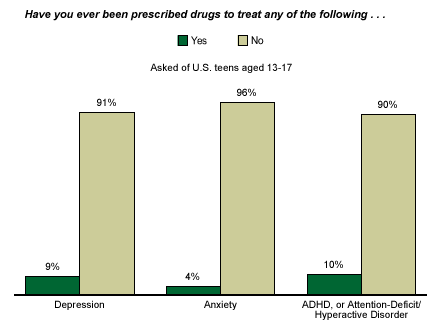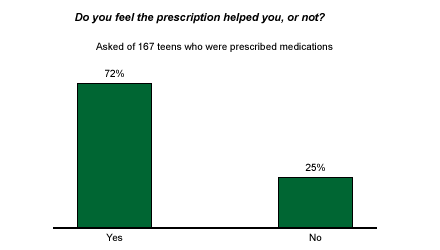Last week, teenager Christopher Pittman was found guilty of murdering his grandparents, despite his "Zoloft defense." Pittman's lawyers argued unsuccessfully that behavior-altering effects of Zoloft, the most commonly prescribed antidepressant in America, drove Pittman to shoot his grandparents in November 2001, when he was 12.
The merits of using prescription drugs to treat disorders -- such as depression and Attention-Deficit/Hyperactivity Disorder (ADHD) -- in children and teenagers have been a frequent subject of debate since the early 1990s, when the number of ADHD diagnoses rose quickly and doctors began prescribing stimulants such as Ritalin to children in huge numbers. A recent Gallup Youth Survey* of 13- to 17-year-olds investigated how many teens have been prescribed medications for various disorders and whether they feel their medications have helped them.
How Many Teens Take Medications?
The National Institute of Mental Health (NIMH) estimates 5% of adolescents suffer from major depression -- which Pittman was being treated for when he killed his grandparents. Gallup's survey shows 9% of teens say they have been prescribed medication for depression at some point.
According to NIMH, anxiety disorders are the most common mental illness in the United States, but they can be difficult to diagnose in children. Many of the same medications used to treat depression are also used to treat anxiety. According to the Gallup Youth Survey, just 4% of teens have been prescribed medication for anxiety.
ADHD was once thought to affect only children, but is now known to afflict adults as well. The non-profit organization Children and Adults with Attention-Deficit/Hyperactivity Disorder (CHADD) estimates between 3% and 7% of children suffer from ADHD. One in 10 teenagers (10%) tell Gallup they have been prescribed medication for ADHD.

While the prevalence of teens being prescribed medications is small, girls are slightly more likely than boys to say they've been prescribed medication for depression, and boys are slightly more likely to have been treated for ADHD.
Does Medicine Help?
The survey also asked the subset of teenagers who have been prescribed medication for these disorders if they think the medicine helped them. A solid majority -- 72% -- say the medication did help. But a quarter (25%) of teens who say they have been prescribed medication don't think it helped.

Bottom Line
U.S. Food and Drug Administration (FDA) research has shown that children who take certain types of antidepressants have an increased risk of suicidal thoughts or tendencies. The FDA now requires the makers of these antidepressants (including Zoloft) to include labels warning the medicine could increase the risk of suicidal behavior in adolescents and children.
Health risks aside, it appears most teens who have taken or take medication to treat mental disorders believe those medications are a good thing for them. To avoid serious problems, NIMH recommends parents try psychotherapy for their child before resorting to medication, carefully weigh the benefits and risks of a medication before deciding their child should take it, and make sure their child is closely monitored by a physician while taking medication.
*These results are based on telephone interviews with a randomly selected national sample of 1,028 teenagers in the Gallup Poll Panel of households , aged 13 to 17, conducted Jan. 17 to Feb. 6, 2005. For results based on this sample, one can say with 95% confidence that the maximum error attributable to sampling and other random effects is ±3 percentage points. In addition to sampling error, question wording and practical difficulties in conducting surveys can introduce error or bias into the findings of public opinion polls.